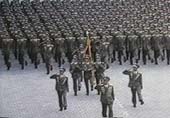Fate of North Korea nuclear program to be decided in Beijing and New York


Six-nation talks on the future of North Korea nuclear program resume after a recess
North Korea, South Korea, Russia, China, Japan and the US have recommenced talks on the future of North Korea's nuclear program interrupted at the end of July. All the participants hope the talks will be a success. However, it is not yet clear if the six-nation talks will be sufficient progress because North Korea insists it has the sovereign right to proceed with the program, Japan and the US insist that Pyongyang must give up not only its military but also peace nuclear program.
Before the talks, Russian Deputy Foreign Minister Alexander Alexeyev and US Assistant Secretary of State Christopher Hill spoke optimistically about results of the talks although the optimism was rather cautious. China, the host of the talks also hopes the meeting will be a success and turn out to be Beijing's diplomatic triumph.
China leader Hu Jintao says China is ready to intensify contacts and cooperation to achieve progress at the talks on the North Korea nuclear program. All the participants expect that text of a treaty on nuclear disarmament of the Korean Peninsula will be completely coordinated at the talks. On Tuesday, Pakistan confirmed that its former nuclear researcher handed "about ten" concentrators for uranium enrichment over to North Korea, and added output of the concentrators could not be enough to make a nuclear bomb.
When US President George W. Bush spoke about nuclear programs of countries that are considered outlaw he said that Iran and North Korea might theoretically have nuclear programs in case it is guaranteed that these programs would not be made military ones. The White House doubts that the nuclear program of Iran, the country rich in oil, is peaceful enough. As for North Korea, Washington is likely to "bless" its nuclear program especially now when North Korea representatives have already said they would give up development of weapons of mass destruction and rejoin the treaty on non-proliferation of nuclear weapons.
But to give up nuclear weapons development North Korea lays down several demands. Pyongyang is sure that it is Korea's sovereign right to proceed with its peace nuclear program. Besides, North Korea demands security guarantees that means inspection of South Korea nuclear objects and US army bases. South Korea seems to be ready to allow such inspections, but the US strongly objects to realization of the demands and states it will never attack not dangerous countries.
Japan's stance is even more implacable. Japan Prime Minister Junichiro Koizumi always insists that North Korea must give up the whole of its nuclear program. And now after Koizumi's absolute victory at the parliamentary election, the Japanese delegation states that North Korea's abandonment of its nuclear programs will be the key issue on the agenda of the talks. What is more, Japan also demands that North Korea must admit it kidnapped several Japanese citizens in the 1970-80s.
Thus, some progress has been achieved within the 1.5 months but this is not a breakthrough yet. It is not ruled out that no decision as concerning North Korea nuclear program will be reached in Beijing, and the issue will be discussed at a meeting of UN leaders in New York where a declaration on fighting nuclear terrorism is to be signed. The future of North Korea's nuclear program mostly depends upon the contents of the declaration.
Ivan Shmelev
Subscribe to Pravda.Ru Telegram channel, Facebook, RSS!


